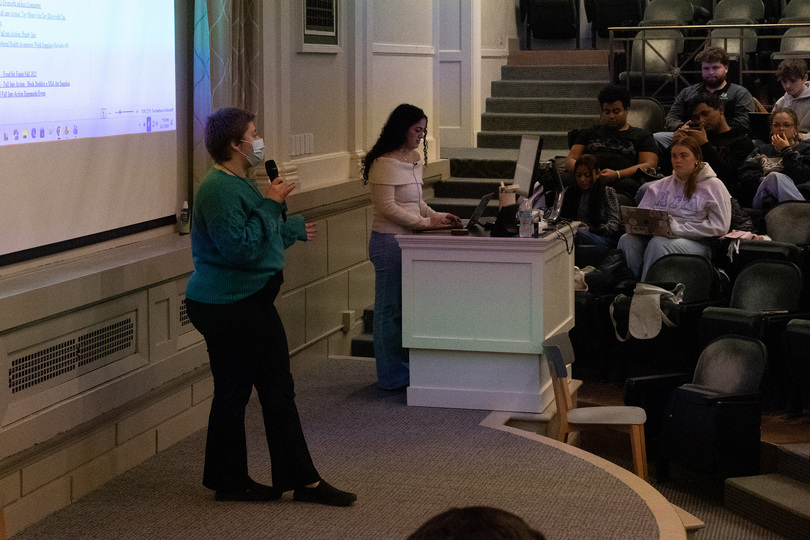SGA addresses AI’s role on campus, considers harm-reduction efforts

Speakers addressed the dangers of artificial intelligence in academic and sexual contexts at Monday’s Student Government Association meeting. The bills presented aim to limit the harm AI may cause on campus. Dana Kim | Staff Photographer
Support The Daily Orange this holiday season! The money raised between now and the end of the year will go directly toward aiding our students. Donate today.
Get the latest Syracuse news delivered right to your inbox.
Subscribe to our newsletter here.
Speakers and bills presented at Syracuse University’s Student Government Association’s Monday meeting addressed the dangers of artificial intelligence in both sexual and academic contexts. The efforts discussed aim to mitigate the harm AI may have on campus.
Leslie Skeffington, assistant director of sexual and relationship violence prevention at the Barnes Center at The Arch, spoke about the different instances of violence students may encounter on college campuses and how her office works to address them.
“Our ideal environment is for students to make informed choices based on what is realistic for them in their life,” Skeffington said
Skeffington teaches students about topics including mental wellness, sexual health and sexual relationship violence, all from a “harm reduction standpoint.”
She said advancements in AI have also impacted sexual and relationship violence cases. She believes AI is harmful for relationships, making digital stalking, deep fakes and negative relationship ideologies “a lot more accessible.”
“At the end of the day, AI is trained by humans, so human behaviors are going to manifest in AI,” she said.
She also described a program her office developed last year called “Coffee and Conversations,” where members from the Health Promotion Department at Barnes Center meet with student groups and organizations to discuss topics relating to sexual violence and awareness.
During these workshops, Skeffington and her colleagues supply coffee and help with conversation guidelines, she said.
“We’ve got the learning objectives with us, but it’s up to everyone on how the conversation goes for what we can really pay attention to,” Skeffington said.
Skeffington said she hopes to work with more groups on campus in addition to the several panhellenic sororities that have already participated. After reaching out to Intrafraternity Council chapters, she said she received no response.
SGA also discussed several bills, the first being the AI Oversight ad hoc committee, which passed with 25 votes in favor.
The bill was first introduced on Nov. 4 by sophomores Indre Espinoza and Chloe Brown Monchamp. The original bill would’ve required SU to release a list of all AI systems the university uses, create a Student Technology Advisory ad hoc committee and complete bias checks.
At that meeting, SGA President German Nolivos suggested the two reform the bill to focus on the formation of an ad hoc committee.
Espinoza and Monchamp returned to the assembly last week to present a revised version; however, some assembly members voiced concerns about how communication between the ad hoc committee and the Academic Affairs committee would work.
Nolivos assured that stronger collaboration would occur between the groups.
In the new version, Speaker of the Assembly Emily Castillo-Melean has the power to decide the chairs of the committee. Castillo-Melean said the bill will now develop an ad hoc committee within SGA that specifically monitors AI within the organization.
SGA will meet after Thanksgiving Break on Dec. 1.
Other Business:
- The Academic Affairs committee presented a funding request bill for a “Food for Finals” event, where SGA provides meals for students in the Schine Student Center during finals week.
- Comptroller Alexis Leach presented the special allocations report, with about $4,000 being approved for RSOs. Six registered student organizations had funding approved, three were partially approved and 12 were denied.
- Two funding requests from the “Fall into Action” initiative were also approved. One allocated money for a toy drive and the second for “ready jars.” The final request introduced was for supplies for Mental Health Awareness Week, which was also approved.





